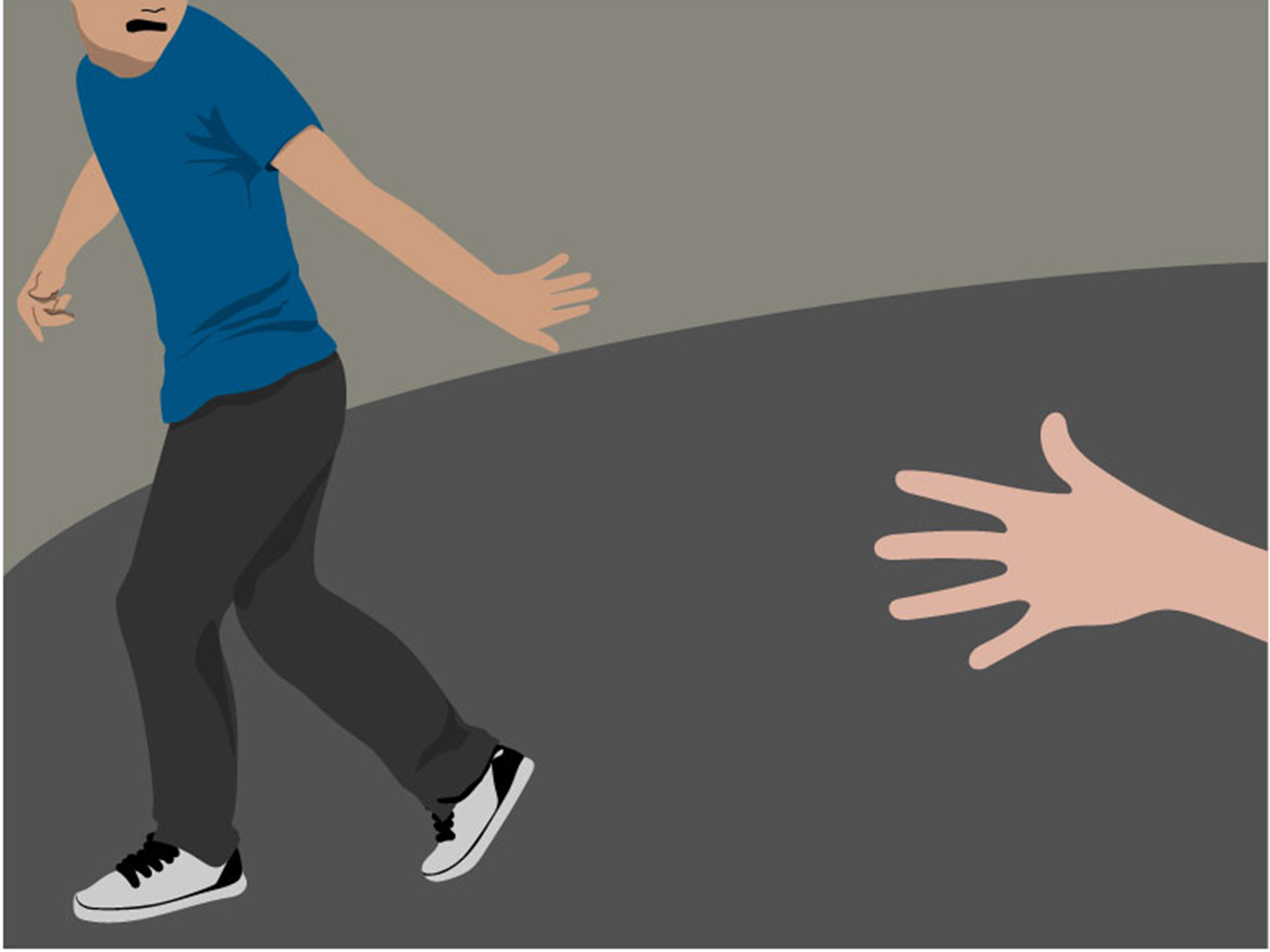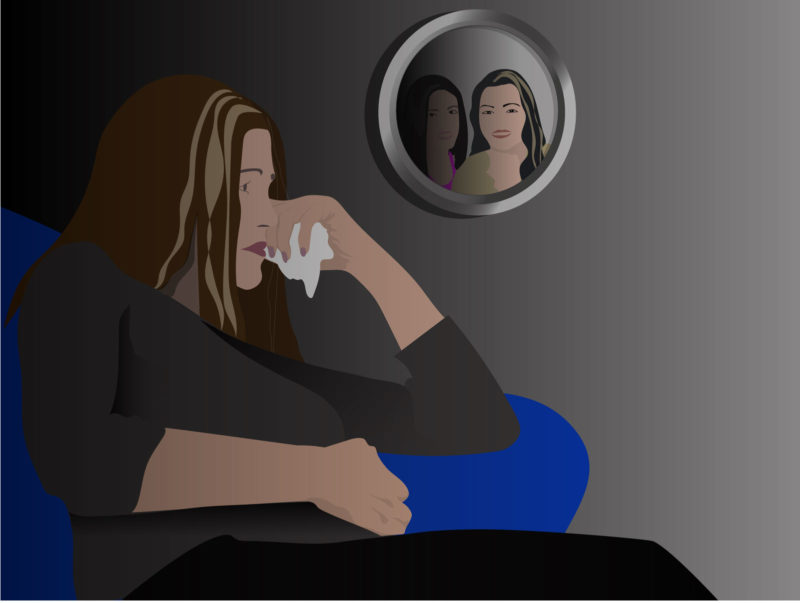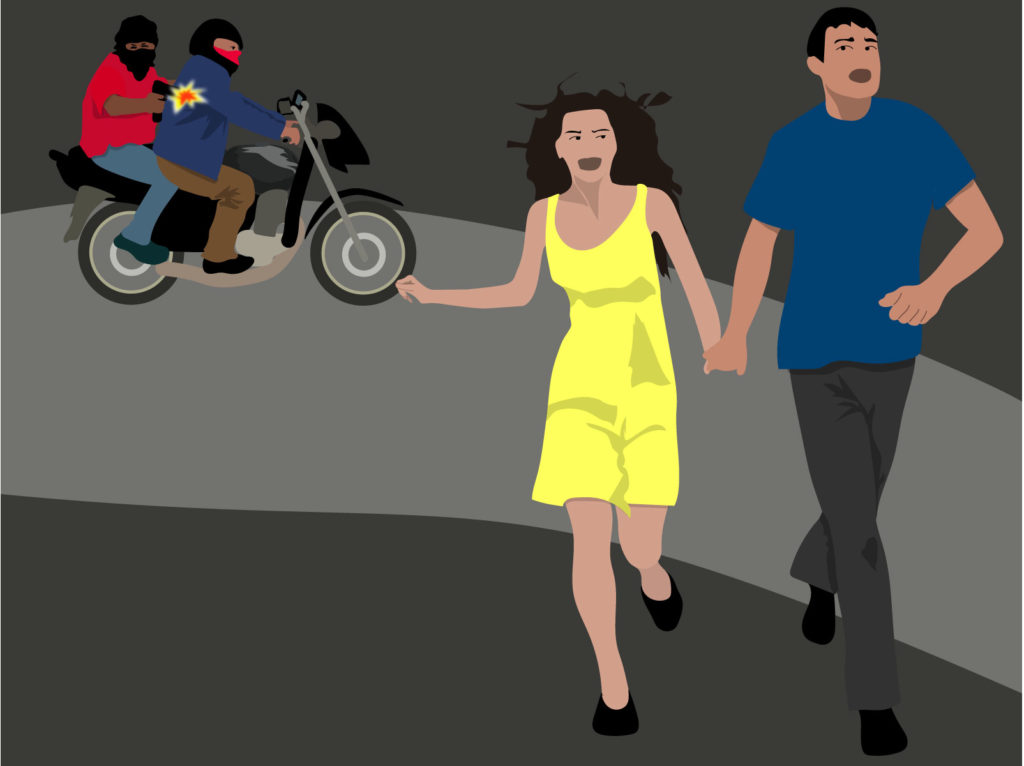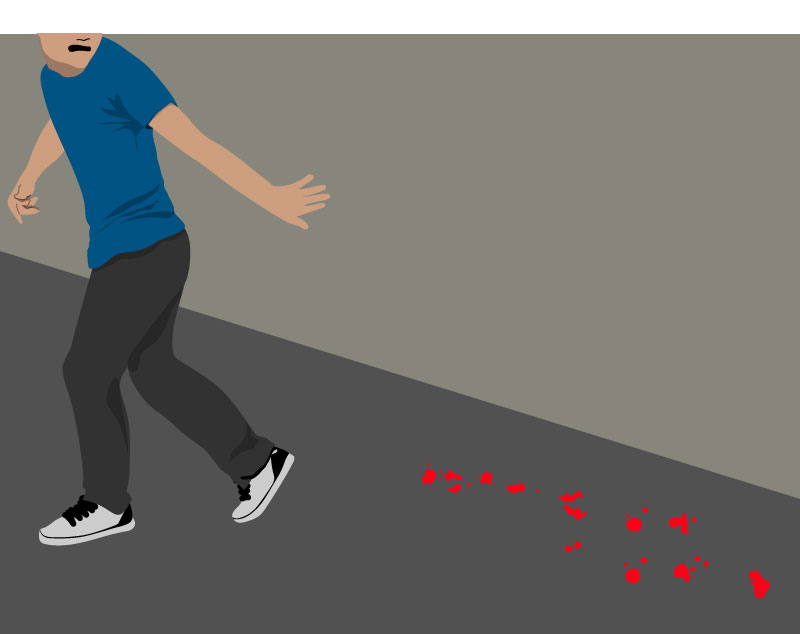

The last of the list of fatalities after the 2017 protests in Táchira state was a girl, Daniela Salomón Machado, aged 15. The poet and storyteller Jacqueline Goldberg talks about how Nohelia, the girl’s mother, experiences that loss and wakes up every day believing that it is a nightmare, praying to God that it be so.

 Ilustrations: Ana Black
Ilustrations: Ana Black
Nohelia Machado feels bites in her belly. A dagger in the heart.
These have been days of bloodshed.
She is in her late thirties. She just had a hysterectomy. From one moment to another, barely seven weeks away, she was ripped off her uterus and her daughter. All the flesh regarding Daniela de Jesus Salomón Machado had been ripped off from her body, disappeared with violence, with an unspeakable pain; a pain that is not possible to describe neither with the help of the Venezuelan judicial system nor with her deep evangelical Christian faith.
While she recounts those meanders of Sunday, July 30, 2017 in which the eldest of her two children was shot at the head, her bowels twist again. The burning of the newly stitched wound intensifies when she recalls the most disturbing instants of the last dawn of her first-born, that of July 31. That’s why she does not stand up before or after the interview. That is the reason why Jesús Armando – 7 years old and Daniela’s only brother on the mother’s side – is who opens the door of the tiny apartment in which they now live alone in the sector 23 de Enero of San Cristóbal, in the Táchira state, just above her own hairdressing store.
Unpronounceable setbacks speak from the wound left by the bullet and scalpel. So, the memory. So, the mother in her scars without boundaries.
“I was told that when Cesar, Daniela’s boyfriend, went into the hospital carrying her in his arms, nobody could tell who was who, or where my daughter was shot. He was completely drenched in blood. I started to hit César when the doctor told me to expect the worst. I told him it was his fault, because he had not taken care of her for me”.
César Sánchez and Daniela Salomón became sweethearts around January 22, when she turned 15. Just because Nohelia trusted the maturity of her daughter, she allowed the relationship with a 23-years old boy.
“I always told her that I wanted her to become a nurse, because she had that service vocation to help others. During the surgeries I had in my ovaries, gallbladder and kidney, Daniela always took care of me. She healed my stitches, helped me bathe and watched out for my medication. I saw the vocation in her. There are people who do not like doing that, which are afraid or get sick, but for her all of that was normal. Once, she took care of a friend who had several surgeries; of course, Daniela also liked the job of a manicurist, but we had already talked about how expensive the training was, that it was best if she study hairdressing, for which you only need a dryer, a machine, a brush, and I have all that”.

Daniela was indispensable. Not like any son. She was the pillar of a single mother; strong, yes, but very lonely. In the midst of the unexpected helplessness, Nohelia evokes her as – “a chama (kid) who took care of everything in the house, who never got involved in politics or supported the protests” – That she washed, cooked, tide up the rooms, the refrigerator, the hours, her whole life.
She looked out for everything. When her brother was born, she was 8 years old and she also took care of him: she picked him up, gave him a bottle, burp him. She gave him toilet training and taught him to walk. She was my right hand in every way. Even in the hairdressing salon: if she had some time off, she would come down and help me, washing clients’ hair, whatever I told her to do, a hair blow-drying, an ironing, and above that, she was an excellent student; she scored A and A+. She also was very good in English. Only few subjects such as history and geography were a little difficult for her; she though they were boring and, of course, despite that, she passed the tests. My daughter had a future –
But the decisions about that future were still far away, so far that they would never come.
Daniela had finished her fourth year of high school at Colegio Simón Bolívar. The first three years, she studied at the Liceo Nacional Táchira (Táchira’s National Lyceum), from where she had most of her friends, but it was very far from home. She devoted her Saturdays in helping her mother in the beauty salon and on Sundays she went with the family to church, took walks, and sometimes went out with Cesar.
And that Sunday was such a Sunday of bitter locks.

She had lunch. Like so many times, she went walking to her boyfriend’s house, in La Concordia. Despite the protests in other corners of the country, it seemed like another Sunday in the popular neighborhood of 23 de Enero in San Cristóbal, with available public transport, no barricades in sight, quiet, more like of a disturbing solitude.
“Around 2:00 pm, Daniela texted me saying that the environment seemed tense. I told her to stay in Cesar’s house, to be careful, that I was not going to leave home either. But I did not warn her anymore because I never thought that something like that would happen to her. And she left at 6:00 in the afternoon. César’s father had called him asking for his help with some tools because his car broke down few meters away from Plaza Venezuela. Daniela wanted to go with him, despite the fact that he insisted for her to stay with his mother. Probably she was bored, she liked going out and she had been all day locked up”.
Then everything happened with the rush of misfortunes.
They walked in front of a barricade where a small group protested against the ballot that, that same day, elected the members of the National Constituent Assembly. Suddenly -the mother says-, two vans appeared and hooded motorcycles riders with covered plates. Then gunfire broke out. Daniela and Cesar ran holding hands.

He thought the girl had tripped over, but when he turned to pick her up, he saw the blood. He panic and ran into one of the sidewalks of the Las Margaritas neighborhood, because to the other side were the “colectivos”, referring to the paramilitary groups linked to the government. Trying to take her to the hospital, he went down the stairs of the neighborhood with the help of acquaintances. He could see that Daniela was losing a lot of blood. There were no taxis, no private vehicles. A lady driving a gray vehicle offered to take them to the Central Hospital, on Lucio Oquendo Avenue. It was 6:30 pm.
Nohelia Machado had taken a shower shortly before 6:00 pm, and was lying down for a while. A neighbor already knew: “Do not panic, but your daughter has been shot.”
She thought of a bullet grazing her little girl’s arm, or maybe a badly injured leg. She got up with her heart in her throat. While she is recalling that moment, she feels that same heart and her breathing breaking into her lungs, and again a storm in her abdomen.
“I tried to get a grip of myself so that my youngest child did not see how affected I was. I was in a state of denial. I began calling Daniela’s cell phone. Then a taxi pulled up in front of my house. It was Cesar. He shouted to us to come quickly, that in the hospital they were asking for relatives. In that moment, something went through my mind and I said yes, it was true. However, I thought it was nothing serious, but Cesar told me Daniela was in a critical state, that she had been shot in the head”.

The first thing they told to the desperate mother was that Daniela should have a CT scan, but that the CT scanner of the public hospital – the most important in the state – did not work. They explained that they had to move her, but there were only private ambulances, and anyway it was dangerous to move her until she was stable. They had to run some blood tests, but they ran out of the laboratory reagents and had to take the samples to a nearby private laboratory.
“Daniela was bleeding out through her ear and through her mouth. They gave her a transfusion, warning me that they were doing that so that I would not say they had not done anything for her. They only did a CT scan; they never took her to surgery. All I wanted was for the neurosurgeon to come, open her head, take out the bullet and stitch her artery. And that’s it. A solution. But Daniela stayed in bed awaiting death. She was cold, very cold. I took off my coat to wrap her feet, which were like ice cubes. However, she died at 2:50 am of a “cranial neurogenic shock from a gunshot wound.” That’s what they told me. I never knew if the bullet caused brain damage”.
Before death finally clothed the girl, Nohelia was able to say goodbye. I saw how “her belly went up and down”, connected to an artificial fan. When she was already dead, she removed the blanket and gave her one last kiss. Since then, she wakes up every day believing that it is a nightmare, praying to God that this is so.
“I do not believe in this country’s justice, nor that they will find the killer. I always tell the prosecutor who is in charge of the case, that the day will come in which they will see the gun with which my daughter was killed and that this gun will no longer be in the hands of the person who committed the crime. The real culprit will never pay. God is going to take care of it at some point. Only God. Whoever killed my daughter will never forget that he killed a girl, a 15-year-old girl”.
Investigation of Manuel Roa.
Translation: Josefina Blanco


This story is part of the series They were only children, developed in partnership with the Community Learning Center (Cecodap) and the support of El Pitazo.
2806 readings
I am a poet, storyteller, essayist, editor and author of children’s books and testimonial literature. I have my heart set on a genre that encompasses everything, a grammar of silence and poetry.